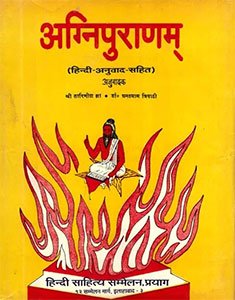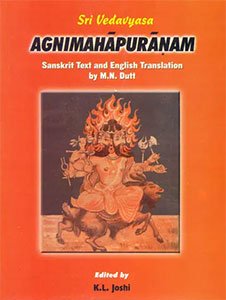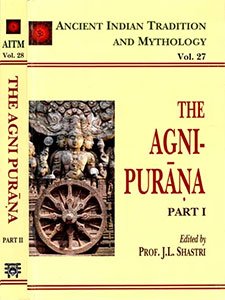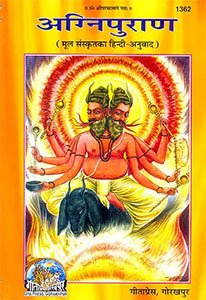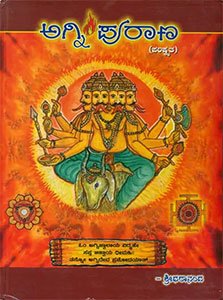Agni Purana [sanskrit]
97,288 words
This Sanskrit edition of the Agnipurana. It is one of the traditional eighteen Mahapuranas presented as an encyclopedia of ancient Indian history and knowledge. It contains either 382 or 383 chapters and over 10.000 verses (Sanskrit Shlokas).
Verse 61.46
।
टिप्पणी ।
१ चलाचलामिति ख ङ चिह्नितपुस्तकपाठः सुलोचनमिति ग चिह्नितपुस्तकपाठः ।
२ मण्डले इति ग ङ चिह्नितपुस्तकद्वयपाठः ।
३ स्वर्णचक्रन्तु मध्यत इति ङ चिह्नितपुस्तकपाठः ।
४ नेत्रं यत्नेन च्छादयेदिति ङ चिह्नितपुस्तकपाठः ।
५ ओं क्षौं नृसिंहाय नम इति ख चिह्नितपुस्तकपाठः । ।
दधिभक्तयुते पात्रे ध्वजस्याग्रं निवेशयेत् ।
ध्रुवाद्येन फडन्तेन ध्वजं मन्त्रेण पूजयेत् ॥ ४६ ॥
|
ṭippaṇī |
1 calācalāmiti kha ṅa cihnitapustakapāṭhaḥ sulocanamiti ga cihnitapustakapāṭhaḥ |
2 maṇḍale iti ga ṅa cihnitapustakadvayapāṭhaḥ |
3 svarṇacakrantu madhyata iti ṅa cihnitapustakapāṭhaḥ |
4 netraṃ yatnena cchādayediti ṅa cihnitapustakapāṭhaḥ |
5 oṃ kṣauṃ nṛsiṃhāya nama iti kha cihnitapustakapāṭhaḥ | |
dadhibhaktayute pātre dhvajasyāgraṃ niveśayet |
dhruvādyena phaḍantena dhvajaṃ mantreṇa pūjayet || 46 ||
The Sanskrit text of Verse 61.46 is contained in the book The Agni Puranam (Anandashram Edition) by Shri Chimna Apate (श्री चिमणा आपटे). This book is available online or you could buy the latest edition:
Read online Buy now! The Sanskrit text by Shri Chimna Apate (श्री चिमणा आपटे) (1987)
Glossary of Sanskrit terms
Note: This extracts Sanskrit terms and links to English definitions from the glossary, based on an experimental segmentation of verse (61.46). Some terms could be superfluous while some might not be mentioned. Click on the word to show English definitions.
Tippani, Calacala, Iti, Kha, Cihnita, Pustaka, Patha, Sulocana, Mandala, Pustakadvaya, Svarna, Madhyatah, Netra, Yatna, Ccha, Aye, Aya, Ksha, Kshi, Aum, Nrisimha, Nama, Namas, Dadhibhakta, Yut, Yuta, Yuti, Patri, Patra, Dhvaja, Agram, Agra, Dhruva, Yena, Yah, Yat, Phat, Anta, Mantra,
Analysis of Sanskrit grammar
Note: this is an experimental feature and only shows the first possible analysis of the Sanskrit text (Verse 61.46). If the system was successful in segmenting the sentence, you will see of which words it is made up of, generally consisting of Nouns, Pronouns, Verbs, Participles and Indeclinables. Click on the link to show all possible derivations of the word.
- Line 1: “ṭippaṇī ”
- ṭippaṇī -
-
ṭippaṇī (noun, feminine)[compound], [nominative single]
- Line 2: “1 calācalāmiti kha ṅa cihnitapustakapāṭhaḥ sulocanamiti ga cihnitapustakapāṭhaḥ ”
- Cannot analyse 1*ca
- calācalām -
-
calācalā (noun, feminine)[accusative single]
- iti -
-
iti (indeclinable particle)[indeclinable particle]iti (noun, feminine)[compound], [adverb]
- kha -
-
kha (noun, masculine)[compound], [vocative single]kha (noun, neuter)[compound], [vocative single]
- ṅa -
-
ṅa (noun, masculine)[compound], [vocative single]
- cihnita -
-
cihnita (noun, masculine)[compound], [vocative single]cihnita (noun, neuter)[compound], [vocative single]
- pustaka -
-
pustaka (noun, masculine)[compound], [vocative single]pustaka (noun, neuter)[compound], [vocative single]
- pāṭhaḥ -
-
pāṭha (noun, masculine)[nominative single]
- sulocanam -
-
sulocana (noun, masculine)[adverb], [accusative single]sulocana (noun, neuter)[adverb], [nominative single], [accusative single]sulocanā (noun, feminine)[adverb]
- iti -
-
iti (indeclinable particle)[indeclinable particle]iti (noun, feminine)[compound], [adverb]
- ga -
-
ga (noun, masculine)[compound], [vocative single]ga (noun, neuter)[compound], [vocative single]
- cihnita -
-
cihnita (noun, masculine)[compound], [vocative single]cihnita (noun, neuter)[compound], [vocative single]
- pustaka -
-
pustaka (noun, masculine)[compound], [vocative single]pustaka (noun, neuter)[compound], [vocative single]
- pāṭhaḥ -
-
pāṭha (noun, masculine)[nominative single]
- Line 3: “2 maṇḍale iti ga ṅa cihnitapustakadvayapāṭhaḥ ”
- Cannot analyse 2*ma
- maṇḍale -
-
maṇḍala (noun, masculine)[compound], [vocative single], [locative single]maṇḍala (noun, neuter)[compound], [nominative dual], [vocative single], [vocative dual], [accusative dual], [locative single]maṇḍalā (noun, feminine)[nominative single], [nominative dual], [vocative single], [vocative dual], [accusative dual]
- iti -
-
iti (indeclinable particle)[indeclinable particle]iti (noun, feminine)[compound], [adverb]
- ga -
-
ga (noun, masculine)[compound], [vocative single]ga (noun, neuter)[compound], [vocative single]
- ṅa -
-
ṅa (noun, masculine)[compound], [vocative single]
- cihnita -
-
cihnita (noun, masculine)[compound], [vocative single]cihnita (noun, neuter)[compound], [vocative single]
- pustakadvaya -
-
pustakadvaya (noun, masculine)[compound], [vocative single]pustakadvaya (noun, neuter)[compound], [vocative single]
- pāṭhaḥ -
-
pāṭha (noun, masculine)[nominative single]
- Line 4: “3 svarṇacakrantu madhyata iti ṅa cihnitapustakapāṭhaḥ ”
- Cannot analyse 3*sv
- svarṇa -
-
svarṇa (noun, masculine)[compound], [vocative single]svarṇa (noun, neuter)[compound], [vocative single]
- ca -
-
ca (indeclinable conjunction)[indeclinable conjunction]ca (noun, masculine)[compound], [vocative single]ca (noun, neuter)[compound], [vocative single]
- krantu -
-
√kṛ (verb class 2)[imperative active third plural]
- madhyata* -
-
madhyataḥ (indeclinable)[indeclinable]
- iti -
-
iti (indeclinable particle)[indeclinable particle]iti (noun, feminine)[compound], [adverb]
- ṅa -
-
ṅa (noun, masculine)[compound], [vocative single]
- cihnita -
-
cihnita (noun, masculine)[compound], [vocative single]cihnita (noun, neuter)[compound], [vocative single]
- pustaka -
-
pustaka (noun, masculine)[compound], [vocative single]pustaka (noun, neuter)[compound], [vocative single]
- pāṭhaḥ -
-
pāṭha (noun, masculine)[nominative single]
- Line 5: “4 netraṃ yatnena cchādayediti ṅa cihnitapustakapāṭhaḥ ”
- Cannot analyse 4*ne
- netram -
-
netra (noun, masculine)[adverb], [accusative single]netra (noun, neuter)[adverb], [nominative single], [accusative single]
- yatnena -
-
yatna (noun, masculine)[instrumental single]
- cchād -
-
ccha (noun, masculine)[adverb], [ablative single]ccha (noun, neuter)[adverb], [ablative single]
- aye -
-
aye (indeclinable)[indeclinable]aya (noun, masculine)[locative single]i (noun, masculine)[dative single]e (noun, masculine)[dative single]
- diti -
-
diti (noun, feminine)[compound], [adverb]diti (noun, masculine)[compound], [adverb]
- ṅa -
-
ṅa (noun, masculine)[compound], [vocative single]
- cihnita -
-
cihnita (noun, masculine)[compound], [vocative single]cihnita (noun, neuter)[compound], [vocative single]
- pustaka -
-
pustaka (noun, masculine)[compound], [vocative single]pustaka (noun, neuter)[compound], [vocative single]
- pāṭhaḥ -
-
pāṭha (noun, masculine)[nominative single]
- Line 6: “5 oṃ kṣauṃ nṛsiṃhāya nama iti kha cihnitapustakapāṭhaḥ | ”
- Cannot analyse 5*oṃ
- Cannot analyse om*kṣ
- kṣau -
-
kṣa (noun, masculine)[compound], [nominative dual], [vocative single], [vocative dual], [accusative dual]kṣa (noun, neuter)[compound], [vocative single]kṣā (noun, feminine)[nominative single]kṣi (noun, feminine)[locative single]
- aum -
-
aum (indeclinable)[indeclinable]
- nṛsiṃhāya -
-
nṛsiṃha (noun, masculine)[dative single]
- nama* -
-
namas (noun, masculine)[compound], [vocative single]namas (noun, neuter)[compound], [nominative single], [vocative single], [accusative single]nama (noun, masculine)[nominative single]
- iti -
-
iti (indeclinable particle)[indeclinable particle]iti (noun, feminine)[compound], [adverb]
- kha -
-
kha (noun, masculine)[compound], [vocative single]kha (noun, neuter)[compound], [vocative single]
- cihnita -
-
cihnita (noun, masculine)[compound], [vocative single]cihnita (noun, neuter)[compound], [vocative single]
- pustaka -
-
pustaka (noun, masculine)[compound], [vocative single]pustaka (noun, neuter)[compound], [vocative single]
- pāṭhaḥ -
-
pāṭha (noun, masculine)[nominative single]
- Line 7: “dadhibhaktayute pātre dhvajasyāgraṃ niveśayet ”
- dadhibhakta -
-
dadhibhakta (noun, masculine)[compound], [vocative single]dadhibhakta (noun, neuter)[compound], [vocative single]
- yute -
-
yut (noun, masculine)[dative single]yut (noun, neuter)[dative single]yuta (noun, masculine)[locative single]yuta (noun, neuter)[nominative dual], [vocative dual], [accusative dual], [locative single]yutā (noun, feminine)[nominative dual], [vocative single], [vocative dual], [accusative dual]yuti (noun, feminine)[vocative single]√yu -> yuta (participle, masculine)[locative single from √yu class 2 verb], [locative single from √yu class 6 verb], [locative single from √yu class 9 verb]√yu -> yuta (participle, neuter)[nominative dual from √yu class 2 verb], [vocative dual from √yu class 2 verb], [accusative dual from √yu class 2 verb], [locative single from √yu class 2 verb], [nominative dual from √yu class 6 verb], [vocative dual from √yu class 6 verb], [accusative dual from √yu class 6 verb], [locative single from √yu class 6 verb], [nominative dual from √yu class 9 verb], [vocative dual from √yu class 9 verb], [accusative dual from √yu class 9 verb], [locative single from √yu class 9 verb]√yu -> yutā (participle, feminine)[nominative dual from √yu class 2 verb], [vocative single from √yu class 2 verb], [vocative dual from √yu class 2 verb], [accusative dual from √yu class 2 verb], [nominative dual from √yu class 6 verb], [vocative single from √yu class 6 verb], [vocative dual from √yu class 6 verb], [accusative dual from √yu class 6 verb], [nominative dual from √yu class 9 verb], [vocative single from √yu class 9 verb], [vocative dual from √yu class 9 verb], [accusative dual from √yu class 9 verb]√yu -> yuta (participle, masculine)[locative single from √yu class 3 verb]√yu -> yuta (participle, neuter)[nominative dual from √yu class 3 verb], [vocative dual from √yu class 3 verb], [accusative dual from √yu class 3 verb], [locative single from √yu class 3 verb]√yu -> yutā (participle, feminine)[nominative dual from √yu class 3 verb], [vocative single from √yu class 3 verb], [vocative dual from √yu class 3 verb], [accusative dual from √yu class 3 verb]√yu (verb class 2)[present middle third single]
- pātre -
-
pātṛ (noun, masculine)[dative single]pātra (noun, masculine)[locative single]pātra (noun, neuter)[nominative dual], [vocative dual], [accusative dual], [locative single]
- dhvajasyā -
-
dhvaja (noun, masculine)[genitive single]
- agram -
-
agram (indeclinable)[indeclinable]agra (noun, masculine)[adverb], [accusative single]agra (noun, neuter)[adverb], [nominative single], [accusative single]agrā (noun, feminine)[adverb]
- ni -
-
ni (noun, masculine)[compound], [adverb]ni (noun, neuter)[compound], [adverb], [nominative single], [vocative single], [accusative single]ni (noun, feminine)[compound], [adverb]nī (noun, masculine)[adverb]nī (noun, neuter)[compound], [adverb], [nominative single], [vocative single], [accusative single]nī (noun, feminine)[adverb]ni (Preverb)[Preverb]
- veśayet -
-
√viś (verb class 0)[optative active third single]√viś (verb class 0)[optative active third single]
- Line 8: “dhruvādyena phaḍantena dhvajaṃ mantreṇa pūjayet ”
- dhruvād -
-
dhruva (noun, masculine)[adverb], [ablative single]dhruva (noun, neuter)[adverb], [ablative single]
- yena -
-
yena (indeclinable)[indeclinable]ya (noun, masculine)[instrumental single]yaḥ (pronoun, masculine)[instrumental single]yat (pronoun, neuter)[instrumental single]
- phaḍ -
-
phaṭ (indeclinable)[indeclinable]
- antena -
-
anta (noun, masculine)[instrumental single]anta (noun, neuter)[instrumental single]
- dhvajam -
-
dhvaja (noun, masculine)[adverb], [accusative single]dhvajā (noun, feminine)[adverb]
- mantreṇa -
-
mantra (noun, masculine)[instrumental single]
- pūjayet -
-
√pūj (verb class 10)[optative active third single]
Other editions:
Also see the following editions of the Sanskrit text or (alternative) English translations of the Verse 61.46
Agni Purana with Hindi Translation
by Tarinish Jha and Dr. Ghanshayam Tripathi (तारिणीश् झा और डॉ. घनश्याम त्रिपाठी) (2007)
Publisher: Hindi Sahitya Sammelan, Allahabad; 1199 pages; Title: अग्निपुराणम् (संस्कृत एवं हिन्दी अनुवाद);
Buy now!
Agni Purana (Two Volumes)
by M. N. Dutt (2023)
Publisher: Parimal Publication Pvt. Ltd.; Editor: K. L. Joshi.; ISBN-10: 8171101690; ISBN-13: 9788171101696; 1070 pages.
Buy now!
Agni-Purana (Set of 4 Volumes)
by N. Gangadharan (2006)
Publisher: Motilal Banarsidass Publishers Pvt. Ltd.; ISBN: Part I 8120803590 (9788120803596); Part II 8120803604 (9788120803602); Part III 8120801741 (9788120801745); Part IV 812080306X (9788120803060); 1271 pages.
Buy now!
The Agni Purana (Hindi)
by (2013)
Publisher: Gita Press, Gorakhpur; Title: अग्निपुराण (केवल हिन्दी अनुवाद); ISBN-10: 8129302934; ISBN-13: 9788129302939; 848 pages.
Buy now!
Agni Purana (Kannada)
by Sreedharananda (2013)
Publisher: Pooja Pusthaka Bhandara, Bangalore; Title: ಅಗ್ನಿ ಪುರಾಣ; 560 pages.
Buy now!Preview of verse 61.46 in Kannada sript:
।
ಟಿಪ್ಪಣೀ ।
೧ ಚಲಾಚಲಾಮಿತಿ ಖ ಙ ಚಿಹ್ನಿತಪುಸ್ತಕಪಾಠಃ ಸುಲೋಚನಮಿತಿ ಗ ಚಿಹ್ನಿತಪುಸ್ತಕಪಾಠಃ ।
೨ ಮಣ್ಡಲೇ ಇತಿ ಗ ಙ ಚಿಹ್ನಿತಪುಸ್ತಕದ್ವಯಪಾಠಃ ।
೩ ಸ್ವರ್ಣಚಕ್ರನ್ತು ಮಧ್ಯತ ಇತಿ ಙ ಚಿಹ್ನಿತಪುಸ್ತಕಪಾಠಃ ।
೪ ನೇತ್ರಂ ಯತ್ನೇನ ಚ್ಛಾದಯೇದಿತಿ ಙ ಚಿಹ್ನಿತಪುಸ್ತಕಪಾಠಃ ।
೫ ಓಂ ಕ್ಷೌಂ ನೃಸಿಂಹಾಯ ನಮ ಇತಿ ಖ ಚಿಹ್ನಿತಪುಸ್ತಕಪಾಠಃ । ।
ದಧಿಭಕ್ತಯುತೇ ಪಾತ್ರೇ ಧ್ವಜಸ್ಯಾಗ್ರಂ ನಿವೇಶಯೇತ್ ।
ಧ್ರುವಾದ್ಯೇನ ಫಡನ್ತೇನ ಧ್ವಜಂ ಮನ್ತ್ರೇಣ ಪೂಜಯೇತ್ ॥ ೪೬ ॥
![Agni Purana [sanskrit] - book cover](/uploads/a/Agni-Purana-Sanskrit.jpg)
